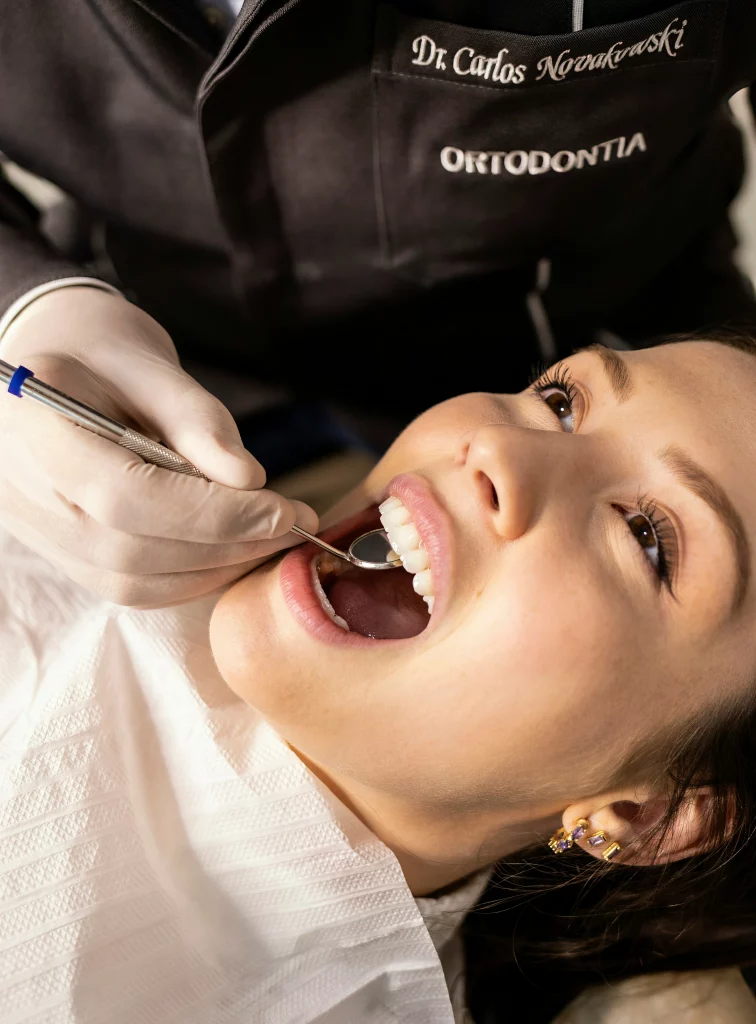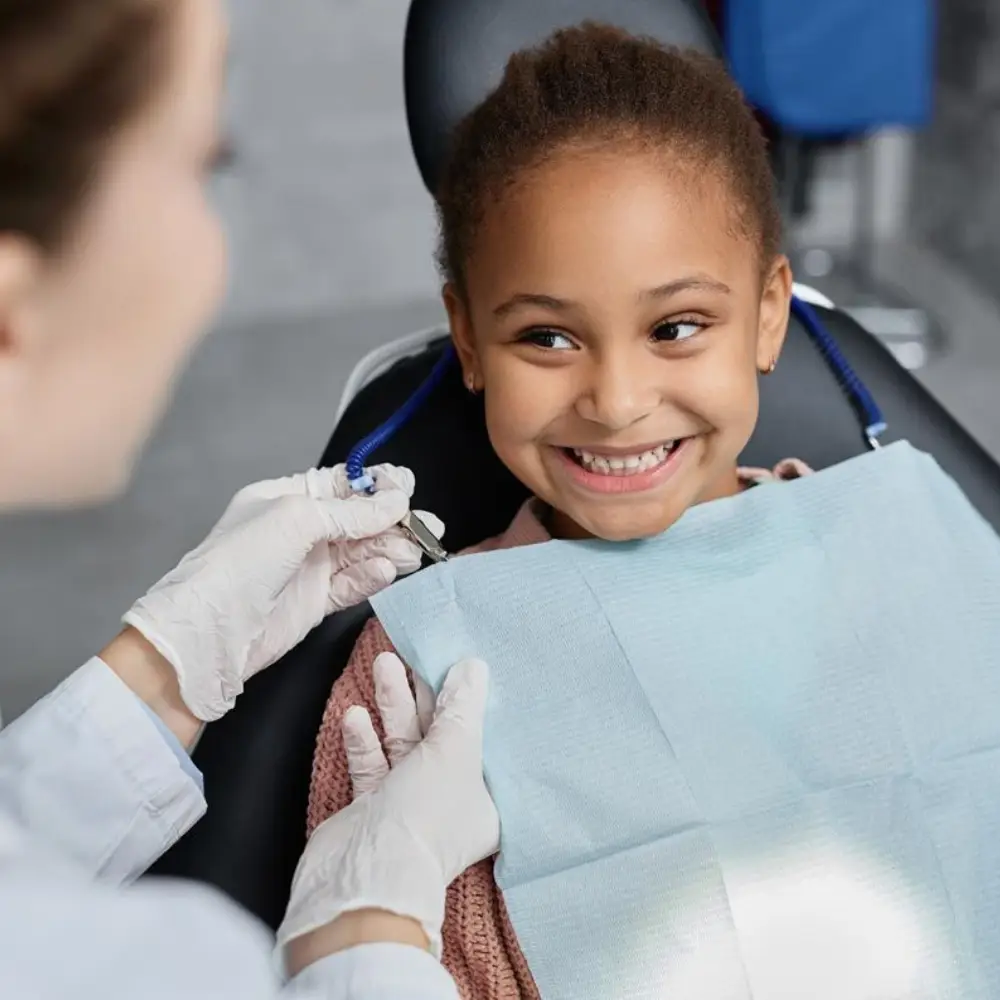Teeth whitening is one of the most sought-after cosmetic dental procedures, but during pregnancy, many women understandably pause to consider safety. Hormonal fluctuations can increase gum sensitivity and make teeth more prone to staining or irritation. Additionally, concerns about the effects of whitening chemicals on a developing baby often lead expectant mothers to proceed cautiously. While maintaining a bright, confident smile is still possible during pregnancy, it requires knowing which methods are safe, which should be avoided, and how to prioritize overall oral health.
This blog offers evidence-based insights on safe teeth whitening alternatives, debunks common myths, and explores post-pregnancy options for moms who want a radiant smile without compromising their health or their baby’s well-being. With the right approach, you can protect your oral health while keeping your smile glowing throughout this special time.
Can You Whiten Teeth While Pregnant?

The question many expectant mothers are asking themselves is whether teeth whitening is safe. Cosmetic dental work should be taken care of because hormones may render gums sensitive and teeth vulnerable. The information about the safety of teeth whitening techniques, their lack of safety and how to maintain healthy teeth can help save your smile and your baby. This section discusses the guidelines and the hints in whitening teeth during pregnancy.
Safety Concerns Around Teeth Whitening Chemicals
Professional teeth whitening is commonly done with hydrogen peroxide or carbamide peroxide to whiten the teeth. They are effective in terms of stain removal and they provide visible results, but their safety in pregnant individuals is unknown. Due to this ambiguity, most dentists will advise you to not undergo chemical whitening during your pregnancy because it is not very safe and that it is more important to be safe than to be beautiful. Although there is no obvious evidence that these treatments have any adverse effects on the baby, pregnancy may lead to gum sensitivity and tooth alterations, which make teeth whitening painful. Therefore, most dentists recommend non-chemical or natural whitening products before giving birth.
Why Dentists Often Advise Waiting Until After Pregnancy
When you are pregnant, your gum tissues are altered and your mouth is likely to be more sensitive which may make whitening treatments more painful. By whitening later after childbirth, it is safer and more comfortable to you, as you were able to experience professional teeth whitening with no additional risk. Waiting could also be recommended by your dentist as they could examine and determine whether your teeth enamel has been worn or your gums irritated and could increase during pregnancy.
Differences Between In-Office and At-Home Whitening During Pregnancy
Stronger bleaching chemicals are used in-office whitening. It is quicker, however, the chemicals are more dangerous. The home whitening kits contain milder chemicals. They are yet not perfect in pregnancy. Dentists will normally recommend waiting to take the chemical whitening after you are pregnant or you are no longer breastfeeding. This assists in keeping the mother and the baby safe. In case you desire to have a bright smile as you wait, then use less dangerous alternatives. Your teeth can be kept white with natural ways of teeth whitening or toothpastes that are safe to use during pregnancy.
Natural and Safe Teeth Whitening Alternatives

Not every method of whitening teeth involves the use of harsh chemicals. They can also have a trial of natural and safe alternatives that help pregnant women have a brighter teeth without being sensitive to it or subjecting their teeth to harmful substances. Basic brushing and housekeeping measures can ensure a bright smile in the course of pregnancy and maintain wellbeing of the mouth and entire body.
Foods That Naturally Brighten Teeth
To stay smiling throughout pregnancy, you can consume some foods that have the ability of cleaning stains on the surface quietly. Fruits and vegetables are crunchy and soft scrapers such as apples, carrots, and celery. They are useful in washing out discoloration and providing you with good nutrients. Strawberries have a natural acid, which might also be used to make small stains light, as well as to make teeth look fresher.
A daily intake of these foods will keep your teeth white and prevent the mouth and body to be unhealthy. These are natural tricks that will not substitute the teeth whitening of a dentist but they are safe and will keep your teeth looking good in the course of pregnancy.
Pregnancy-Safe Whitening Toothpaste and Rinses
It is also a nice idea to use toothpaste and mouth rinse that are safe during pregnancy and keep your smile white without exposing yourself and your baby to the risk of chemicals. Look at the products that indicate that they are fluoride-compatible, non-harmful to your teeth, and they contain no peroxide or damaging bleach. Baking soda or mild polish toothpaste can be used to make small stains light, and is safe in moms who are pregnant. The products also keep your mouth clean, prevent plaque, gum disease and other dental issues that may occur during pregnancy. Choosing the right toothpaste and rinse will help to keep your teeth in style and your own self and your baby safe.
Lifestyle Habits That Help Prevent Stains
It is usually safer and more effective to prevent new stains than attempt to whiten the teeth in the course of pregnancy. It is possible to reduce the chances of staining by avoiding dark beverages such as coffee, tea, and red wine. Brushing your teeth twice a day, flossing, and rinsing or drinking water after eating are some of the ways in which you can maintain a cleaner brighter smile. In addition, avoid smoking and avoid colored or sugary foods.
This will prevent the staining of teeth and your mouth will stay healthy, as well as your baby. When you concentrate on prevention, your smile will always be presentable until the baby is born when it is safe to do professional whitening.
Common Myths About Teeth Whitening in Pregnancy

There are numerous rules in pregnancy, and one of them is the teeth whitening. Misleading information can lead pregnant women to confusion about what is safe and they will have an additional worry or make unsafe decisions. Being aware of the popular myths and facts about them will enable future moms choose how to maintain a healthy bright smile throughout pregnancy.
Are Whitening Strips Safe for Pregnant Women?
Whitening strips are readily available and convenient to use yet they contain peroxide, albeit in small portions that can be dangerous when pregnant. Dentists tend to avoid them because we are not aware of their safety in relation to pregnant women, so they just advise people to avoid them. Wearing these strips may cause your teeth to be more sensitive, gums to be irritated or it may expose you to chemicals. As an alternative, you may use less harmful alternatives such as foods which clean teeth naturally or safe toothpaste during pregnancy. By waiting until you have a baby you are able to do professional or home whitening without putting your child at risk.
Can Activated Charcoal Be Used Safely?
Another natural method of whitening teeth that is popular is activated charcoal, although it is not clear whether it is safe in pregnancy. It is able to remove stains on the surface, but is rough, which can damage enamel or damage sensitive gums. The problems are aggravated by using it excessively or brushing intensively with charcoal. The pregnant moms are not to use charcoal and rather use softer ones that do not harm the pregnancy like fluoride toothpaste or foods that have the ability to remove stains naturally. Safe options make teeth healthy and prevent the loss of enamel or irritation of the gums.
Is Baking Soda a Safe Whitening Alternative?
Baking soda is normally safe and mild to maintain a brighter smile during pregnancy, provided that one does not apply too much of it. It is able to remove light stains on the surface and lighten discoloration without the use of harsh chemicals. However, excessive baking soda consumption or brushing hard using the baking soda may erode enamel. This may lead to dental sensitivity or dental problems in the long run. Baking soda is best mixed with fluoride toothpaste in order to achieve the best results and safety. Fluoride will make enamel stronger and maintain the general oral health. Used correctly, baking soda is a convenient and pregnancy safe method of keeping teeth clean and fresh.
Post-Pregnancy Whitening Options
In cases of pregnancy and breast feeding, at the end of the pregnancy and once the mother stops breast feeding, many females desire to restore or enhance their smile safely. Professional whitening, at-home whitening, or other cosmetics are now an option after pregnancy, which was not previously available. The knowledge of the safest time, safest methods, and products can allow you to achieve good results without damaging your teeth. It is an excellent opportunity to have a brighter and more confident smile and retain your teeth strong and healthy.
When It’s Safe to Start Professional Whitening Again
Once you are pregnant and have healed completely, then you can think about professional teeth whitening once more. Dentists normally recommend waiting until postpartum examinations reveal the mouth to be fine as pregnancy may make gums more sensitive and teeth more prone to minor problems. At this point, you get to decide on in-office whitening which has faster and more immediate effect or at-home kits which can be used to achieve gradual improvement and convenience. Under the supervision of a dentist, you are allowed to choose the alternative, which suits most of your lifestyle and cosmetic objectives, thus being safe and effective.
Breastfeeding Considerations and Whitening Treatments
Moms that breastfeed should consult their dentist prior to any teeth whitening. The majority of the whitening products are consumed in very small amounts, although most professionals recommend waiting until the breast feeding has ceased before administering chemical whitening, just to keep the risk at bay even in the slightest. Meanwhile, with toothpaste or mouthwash, it is possible to use mild and pregnancy safe toothpaste or mouthwash to maintain teeth bright without introducing additional chemicals. This manner, mothers will be able to ensure that they take the care of their smile and remain healthy with their infant.
Choosing the Best Whitening Method After Pregnancy
Once you are pregnant, it is time to choose the whitening plan, which is convenient, easy to use, and comfortable depending on the way you lead your life and keep your teeth healthy. The teeth in the office of the dentist are made white quicker and more noticeable. Home kit offers a slower change, but is more convenient to fit in the schedule of a busy mom. With frequent professional cleaning, as well as other good routines, such as reducing the amount of foods and beverages that cause stains, brushing after meals, and using whitening toothpaste, your teeth will be bright over a long period of time.
A dentist can provide you with a safe and effective plan after pregnancy, which should be the best. This individualized strategy assists moms to achieve bright smile in addition to taking care of their general oral health.
Frequently Asked Questions (FAQs)
1. Is teeth whitening safe during pregnancy?
Most dentists recommend avoiding chemical teeth whitening during pregnancy because there is limited research on its safety for both mother and baby. The peroxide-based agents commonly used in whitening treatments may increase gum sensitivity or enamel irritation, which can already be heightened during pregnancy. Instead, natural alternatives such as crunchy fruits and vegetables, along with pregnancy-safe toothpaste and rinses, are safer ways to maintain brightness. Preventive habits like limiting coffee, tea, and dark-colored foods also help reduce new stains. By waiting until after delivery, mothers can safely pursue professional whitening treatments without unnecessary risks. This approach protects both oral health and overall pregnancy wellness.
2. What whitening options are safe for pregnant women?
Gentle methods such as pregnancy-safe toothpaste, mild rinses, and stain-preventing foods are safe options for maintaining a brighter smile during pregnancy. It’s best to avoid peroxide-based treatments, whitening strips, and abrasive powders, as these may irritate sensitive gums or pose unnecessary risks. Regular dental cleanings and consistent oral hygiene practices, including brushing and flossing, also play an important role in protecting both oral health and tooth appearance. By focusing on safe, non-chemical approaches, expectant mothers can maintain confidence in their smile while prioritizing the safety of their baby.
3. Can whitening harm my baby?
Currently, there is no definitive evidence showing that occasional contact with whitening products directly harms the baby. However, because research is limited, most dental professionals recommend avoiding chemical exposure during pregnancy as a precaution. Opting for natural and safe alternatives, such as pregnancy-safe toothpaste or dietary adjustments, allows mothers to care for their smile without added worry. This cautious approach helps protect both mother and child while maintaining overall oral health.
4. When can I safely whiten my teeth again after pregnancy?
Professional whitening treatments can generally resume once childbirth and recovery are complete, provided the mother’s oral health is stable. For those who are breastfeeding, it is best to consult a dentist before beginning chemical whitening to ensure safety. Some professionals may recommend waiting until breastfeeding is finished to minimize any potential risks. This cautious approach helps protect both the mother and baby while ensuring whitening results are safe and effective.
5. Are natural whitening remedies safe to use while pregnant?
Yes, natural remedies like crunchy fruits, vegetables, and moderate use of baking soda are considered safe during pregnancy. These options work by gently scrubbing away surface stains without introducing harmful chemicals. When paired with good oral hygiene habits such as regular brushing, flossing, and dental checkups, they help maintain both a healthy smile and overall oral health. While results may not be as dramatic as professional whitening, they provide a safe, effective way to manage tooth discoloration until after pregnancy.
Maintaining a bright smile during pregnancy requires safe, gentle approaches. While chemical teeth whitening is not recommended, pregnancy-safe toothpaste, natural foods, and lifestyle adjustments help prevent stains and maintain oral health. After delivery, professional whitening can safely resume for those seeking more dramatic results.
If you are expecting and want to keep your smile radiant, consult your dentist for personalized guidance. They can recommend safe alternatives and preventive measures until professional whitening is appropriate. Protect your oral health and enjoy a confident, bright smile during and after pregnancy.


